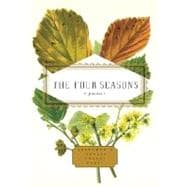
What is included with this book?
| Foreword | |
| SPRING | |
| First Sight of Spring Thomas Hardy | |
| The Year’s Awakening Emily Dickinson‘‘ | |
| Light exists in Spring’’ | |
| Spring William Shakespeare‘‘ | |
| It was a lover and his lass’’ | |
| Nothing Gold Can Stay | |
| March Gerard | |
| Spring | |
| Black March | |
| Spring Pools | |
| Loveliest of trees’’ | |
| March Morning Unlike Others | |
| Putting in the Seed | |
| Spring | |
| The Lent Lily | |
| Spring Song II | |
| Another April | |
| Resurrections | |
| Cold Spring | |
| Lines Written in Early Spring | |
| Sonnet to Spring | |
| Spring | |
| Corinna’s Going a-Maying | |
| The Widow’s Lament in Springtime | |
| The Enkindled Spring Charlotte Mew‘‘ | |
| I so liked Spring’’ Emily Dickinson‘‘ | |
| A little Madness in the Spring’’ | |
| Another Spring | |
| Naming of Parts | |
| April Light | |
| A Storm in April | |
| To Daffodils | |
| There Will Come Soft Rains | |
| Home-Thoughts, from Abroad Lizette Woodworth Reese | |
| April in Town E. E. Cummings[in Just-] Walt Whitman | |
| Out of May’s Shows Selected Mary Oliver | |
| Spring SUMMER Anon.‘‘Summer is y-comen in’’ | |
| Roundel | |
| The House was Quiet and the World was Calm | |
| Further in Summer than the Birds Henry Howard, Earl of Surrey | |
| The Sweet Season | |
| "At the Royal Academy Henry David Thoreau"Woof of the sun’’ | |
| Summer Poem | |
| End of May | |
| I Think | |
| Summer Moods | |
| On the Grasshopper and the Cricket | |
| Summer Night | |
| June in the Suburbs | |
| Trees Amy Clampitt | |
| Lindenbloom | |
| A July Afternoon by the Pond Léonie Adams | |
| Midsummer Anon. Summer Song Ted Hughes | |
| Heatwave May | |
| Flag of Summer | |
| Summer Wind Henry | |
| The Summer Rain | |
| The Rainy Summer | |
| My Father Paints a Summer | |
| Falling Asleep in a Garden | |
| Dog-Days Robert | |
| August Moon | |
| August Moon | |
| Late August on the Lido | |
| Hyla Brook | |
| Summer is Ended | |
| "As imperceptibly as God" A.E. Housman"When summer's end is nighing" AUTUMN | |
| To Autumn | |
| "Summer begins to have the look" Emily Brontë | |
| "Fall, leaves, fall" | |
| Unharvested | |
| Autumn | |
| Autumn | |
| Autumn Edna | |
| Autumn | |
| Ode to the West Wind | |
| The Seven Sorrows | |
| An Autumn | |
| Table of Contents provided by Publisher. All Rights Reserved. |
The New copy of this book will include any supplemental materials advertised. Please check the title of the book to determine if it should include any access cards, study guides, lab manuals, CDs, etc.
The Used, Rental and eBook copies of this book are not guaranteed to include any supplemental materials. Typically, only the book itself is included. This is true even if the title states it includes any access cards, study guides, lab manuals, CDs, etc.
Excerpted from The Four Seasons: Poems
All rights reserved by the original copyright owners. Excerpts are provided for display purposes only and may not be reproduced, reprinted or distributed without the written permission of the publisher.